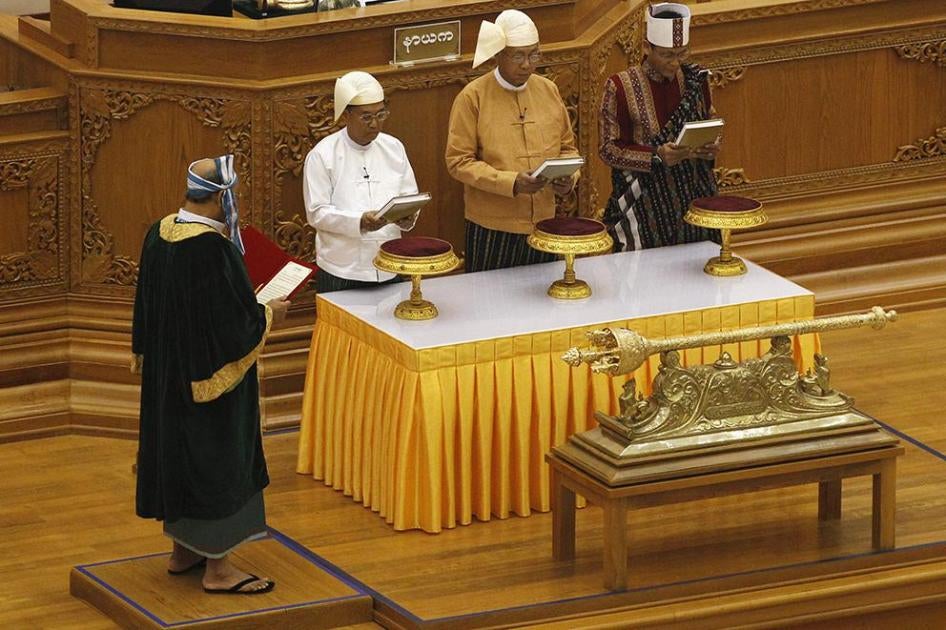(New York) – Burma’s new government led by the National League for Democracy (NLD) should signal human rights are a top priority by presenting a plan of action to begin long-needed reforms, Human Rights Watch said today in a letter to new president Htin Kyaw.
“The NLD-led government has already set the right tone by releasing many political prisoners and dropping charges against hundreds of activists,” said Brad Adams, Asia director. “But many difficult problems remain, tied to issues such as minority rights, land disputes, and freedom of expression, which require a clear and specific plan of action to tackle successfully.”
The NLD won a landslide victory in the November 8, 2015 elections, but faces serious structural impediments to instituting reforms. These include the deeply flawed 2008 constitution, which allows the military to maintain significant control over the civilian government. The military still controls the Defense, Home Affairs, and Border Affairs Ministries, and is empowered to dismiss the government. It also has a quota of 25 percent of seats in parliament.
Other challenges include a poorly trained and unprofessional judiciary, the lack of rule of law, and abusive and unaccountable military and police. Security forces continue to arrest peaceful protesters and government critics, while an estimated 61 political prisoners remain behind bars, according to prisoner groups.
“Half a century of military rule can’t be washed away overnight, but there are many things the new government can do in the short term to set a new tone and direction,” Adams said. “The NLD should use its broad mandate to ensure the rights of all Burmese are respected and genuine democratic rule takes hold.”
Militant Buddhist groups and others have incited or participated in violence and discrimination against religious and ethnic minorities. While much of Southeast Asia has seen major economic development over the past half century, decades of military rule have left most Burmese in extreme poverty, made worse by large-scale corruption. Ongoing armed conflict between successive governments and ethnic armed groups has resulted in abuses, extreme hardship, and displacement for millions of civilians.
Human Rights Watch called on President Htin Kyaw and his government to urgently pursue targeted legal reform of repressive and rights-abusing laws still used by local officials to silence critics. Parliament has recently started the process to repeal the draconian 1975 State Protection Law. Human Rights Watch also recommended that the government promote the rights of women, land rights, and health and human rights, and facilitate consultations with civil society groups in reform efforts.
The new government should address Burmese military and armed group abuses as part of the nationwide peace process, including by facilitating women’s participation in talks. It should also adopt measures to ensure accountability for past and ongoing violations.
The new government faces a major challenge in improving the human rights and humanitarian conditions for Rohingya Muslims, as well as in ending discrimination and threats of violence against all Muslim minorities to avert further communal and religious tensions. Longstanding restrictions on the basic rights of Rohingya and other minorities should be speedily removed. Restrictions on freedom of movement contributed to the deaths at sea on April 19, 2016, of about 20 internally displaced Muslims. Revamping the discriminatory 1982 Citizenship Law, which has effectively deprived Rohingya of Burmese citizenship, should be a priority. The new government should also repeal the four discriminatory “race and religion protection laws” passed by the previous government.
Human Rights Watch called on the military to stop blocking constitutional reform. At the same time, the government should make a commitment to repeal or amend rights-abusing and discriminatory provisions in the 2008 constitution.
“The new government has a historic opportunity to show the Burmese people that the recent elections will bring real change,” said Adams. “But it is crucial that the military stands aside and allows the government to undertake badly needed reforms.”









